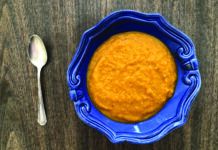Answer : We checked your nut idea with Helen Rasmussen, PhD, MS, RD, an instructor at Tufts Friedman School and Senior Research Dietitian at the HNRCA Metabolic Research Unit. Happily, Rasmussen has a Tufts University School of Medicine student, Eva Litvak, working with her who could dig into this question in-depth.
Bacterial contamination of food can happen at any stage of food processing, from growth, to harvest, to storage, to packaging, to its final preparation. Any time foods are stored within a certain range of temperatures that are optimal for bacterial growth, the chances of contamination also increase. Eggs and raw animal products are much more likely to be exposed to bacteria during processing and must always be heated to appropriate temperatures during cooking. Though nuts may also be exposed to bacteria, most are dry-roasted after harvest, which kills bacteria at that stage of processing. Because of their high fat and low moisture content, however, heat-processing nuts may be a lengthy and unreliable method of preventing contamination at home.
For more information, see the National Institutes of Health website on Bacteria and Foodborne Illness digestive.niddk. nih.gov/ ddiseases/pubs/bacteria.



















